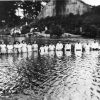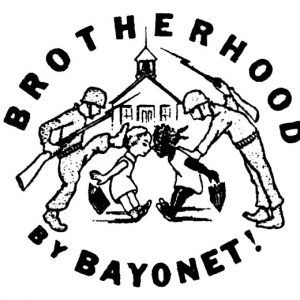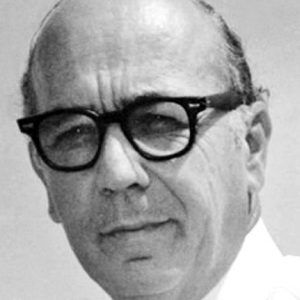calsfoundation@cals.org
James Wesley Pruden Sr. (1908–1979)
James Wesley Pruden Sr., a Southern Baptist minister, was first chaplain and then president of the Little Rock (Pulaski County) chapter of the White Citizens’ Council during the volatile school desegregation period of 1957–58. Pruden led a campaign in the newspapers and in the streets to stop the desegregation of Central High School. Journalist Roy Reed’s analysis of Pruden is that, had it not been for the school crisis, he would have been “destined for the obscurity of a second-tier Baptist Church,” and that he was “a man whose ambition out-paced his abilities.”
Wesley Pruden was the great-grandson of John Pruden, a North Carolina slaveholder. He was born near Alexander (Pulaski and Saline counties) in 1908. He moved early in life to Little Rock to work in a bank. Pruden soon realized he was not cut out for banking, and believing he had received a call to preach the gospel, he left Little Rock to attend Bethany Nazarene College in neighboring Oklahoma.
Upon graduation, he became a traveling evangelist. The life of an itinerant preacher, however, proved not to be Pruden’s calling. He and his wife, Anne Wilder Pruden, had a son named James Wesley Pruden Jr. in 1935. In 1936, he returned to Little Rock and established the Little Country Church. Pruden pioneered radio ministry in the late 1930s and early 1940s in Little Rock, having been introduced to it as a tool in the quest for souls while on the road as an itinerant preacher.
Pruden was not particularly successful as a preacher, however, and he experienced a series of church failures. Pruden even left the Nazarenes and joined the more socially acceptable Baptist denomination without much greater success. He was pastor of Broadmoor Baptist in south Little Rock during the school crisis. Although from this far remove it is difficult to be certain, Pruden’s failures most likely can be attributed to his poor managerial skills and his personal agenda centered on race. Once established at Broadmoor, Pruden looked for a political outlet for his racial views. The Capital Citizens’ Council (CCC) proved to be the ideal organization from which Pruden could voice his racial political opinions. Pruden served as chaplain and then president of the CCC. White “citizens’ councils” had become a common tool to battle integration throughout the South by the mid-1950s. Moreover, along with other CCC leaders, Pruden pressured Governor Orval Faubus to stay the course of segregation. He gave support to those who made up the mob in front of Central High School—verbally encouraging them, according to Reed, “to fight niggers, communists, and cops!” He also placed ads supporting segregation in local newspapers and led the fundraising activities to pay the bail bond of those whites arrested for demonstrating at Central.
Pruden sank back into obscurity after the crisis, continuing to pastor at Ridgecrest Baptist Church, the successor to Broadmoor. He retired in 1975 and died on December 20, 1979, in Little Rock, where he is buried.
For additional information:
Laurez, Earley. “Pastor of the ‘Little Country Church’ Carries on Tradition of His Great-grandfather, Pioneer of Arkansas.” Arkansas Democrat, July 10, 1938, p. 7B.
Reed, Roy. Faubus: The Life and Times of an American Prodigal. Fayetteville: University of Arkansas Press, 1997.
Terry D. Goddard
Northwest Vista College









Comments
No comments on this entry yet.